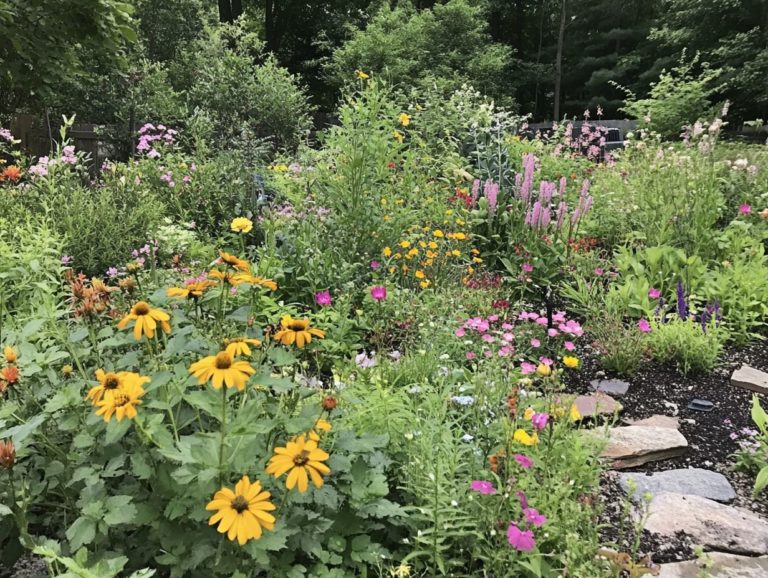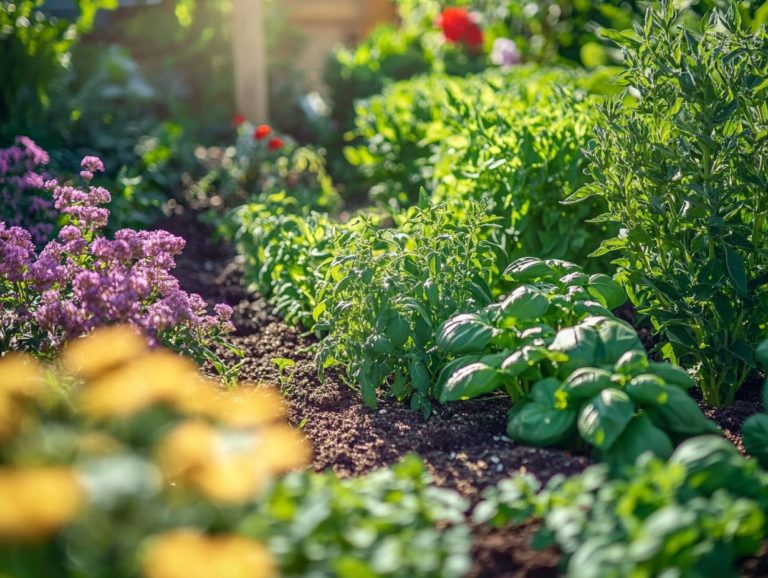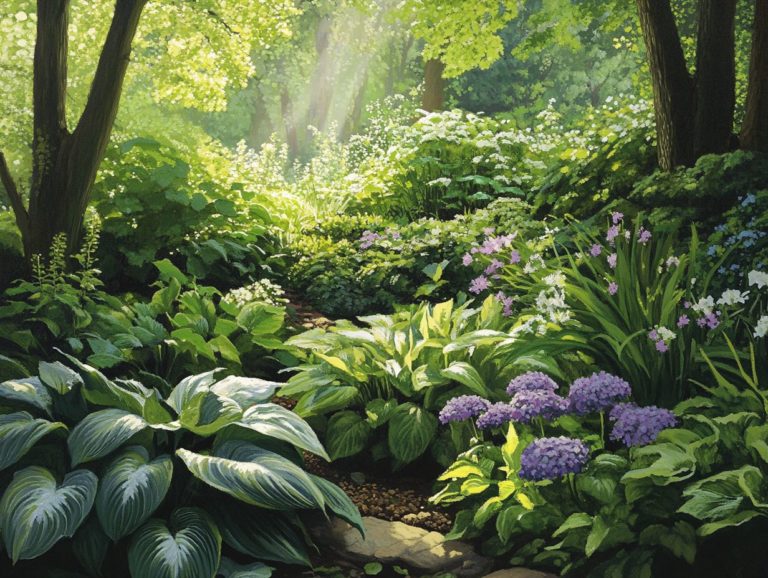“Choosing Plants for a Zen Garden”
Creating a Zen garden presents a unique opportunity for you to cultivate tranquility and mindfulness right in your own outdoor space.
This guide delves into the essential elements of designing your Japanese Zen garden. It emphasizes the importance of selecting the right plants to enhance both beauty and serenity.
You ll explore the key principles that underpin a Zen garden. Discover which types of plants thrive in this calming environment, including Bamboo, Japanese Maple, and Moss. We ll also share valuable tips on care and maintenance, ensuring your garden remains a sanctuary of peace.
You ll also learn how a well-designed garden benefits your mental well-being and physical health.
Start your exciting journey to transform your space into a serene retreat! Create a contemplative beauty that enhances your mindfulness practice.
Contents
- Key Takeaways:
- Designing a Zen Garden
- Choosing Plants for a Zen Garden
- Caring for Plants in a Zen Garden
- Benefits of Plants in a Zen Garden
- Frequently Asked Questions about Zen Gardens
- Q1: What is the purpose of choosing plants for a Zen garden?
- Q2: What types of plants are commonly used in a Japanese Zen garden?
- Q3: How should I choose plants for my Zen garden to ensure balance and harmony?
- Q4: Do I need to have a specific layout or design for my Zen garden to ensure energy flow?
- Q5: Can I incorporate flowers in my Japanese Zen garden?
- Q6: How can I maintain a Zen garden with the chosen plants to ensure seasonal care?
Key Takeaways:
- Choose plants that promote serenity, like evergreens and flowering shrubs, to create a tranquil Zen garden.
- Consider the climate and maintenance needs of plants when selecting for a Zen garden. Their upkeep should be minimal to maintain the garden’s peaceful atmosphere.
- Incorporating plants into a Zen garden can bring numerous mental and physical health benefits, creating a harmonious space for relaxation and meditation.
History and Purpose
Zen gardens originated in ancient Japan, rooted in Zen Buddhism and Japanese culture. Often called ‘Karesansui,’ these gardens embody the principles of simplicity, tranquility, and mindfulness, creating an outdoor sanctuary that fosters your inner peace.
Initially designed for meditation and contemplation, the layout and features of a Zen garden are meticulously crafted to reflect the beauty of nature. This promotes a harmonious flow of energy, essential for achieving balance and tranquility in your life.
Over the centuries, these gardens have evolved, integrating influences from various Japanese aesthetics and philosophies while remaining true to their core purpose. The deliberate placement of gravel, rocks, and plants symbolizes natural landscapes, allowing you to connect more deeply with your surroundings.
Beyond serving as tools for meditation, these tranquil havens invite you to embark on a reflective journey. They encourage exploration of your thoughts and emotions in a serene atmosphere.
Ultimately, the Zen garden stands as a testament to the enduring relationship between nature, art, and inner peace, making it a profound symbol of Japanese heritage and philosophy.
Designing a Zen Garden
Designing a Zen garden demands meticulous planning and a deep appreciation for the essential elements that foster its serene ambiance. To cultivate a harmonious outdoor space that embodies balance and mindfulness, you should explore various design ideas.
Incorporate natural elements like rocks, gravel, and plants into your design. Ensure that your layout aligns with the principles of Feng Shui, a practice that helps create a balanced and harmonious environment, allowing for optimal energy flow throughout your tranquil haven.
Key Elements and Principles
Zen gardens focus on simplicity, balance, and harmony. They create a sanctuary where you can find natural beauty and calm.
Essential features like carefully arranged rocks, gravel that mimics water, and thoughtfully integrated water elements play a crucial role in nurturing a serene environment.
Consider the placement of rocks, which symbolize mountains or islands. They serve as a grounding force, instilling a profound sense of stability. Each stone is intentionally positioned to reflect natural landscapes, evoking a feeling of permanence in your space.
The gravel is raked into patterns that resemble ripples on water. It serves as a gentle reminder of life’s fluidity and the importance of embracing change. Water features, whether a tranquil pond or a small stream, enhance the visual allure and provide soothing sounds that foster relaxation.
Together, these elements harmonize to create a holistic space where you can reflect, breathe, and connect deeply with your surroundings.
Choosing Plants for a Zen Garden
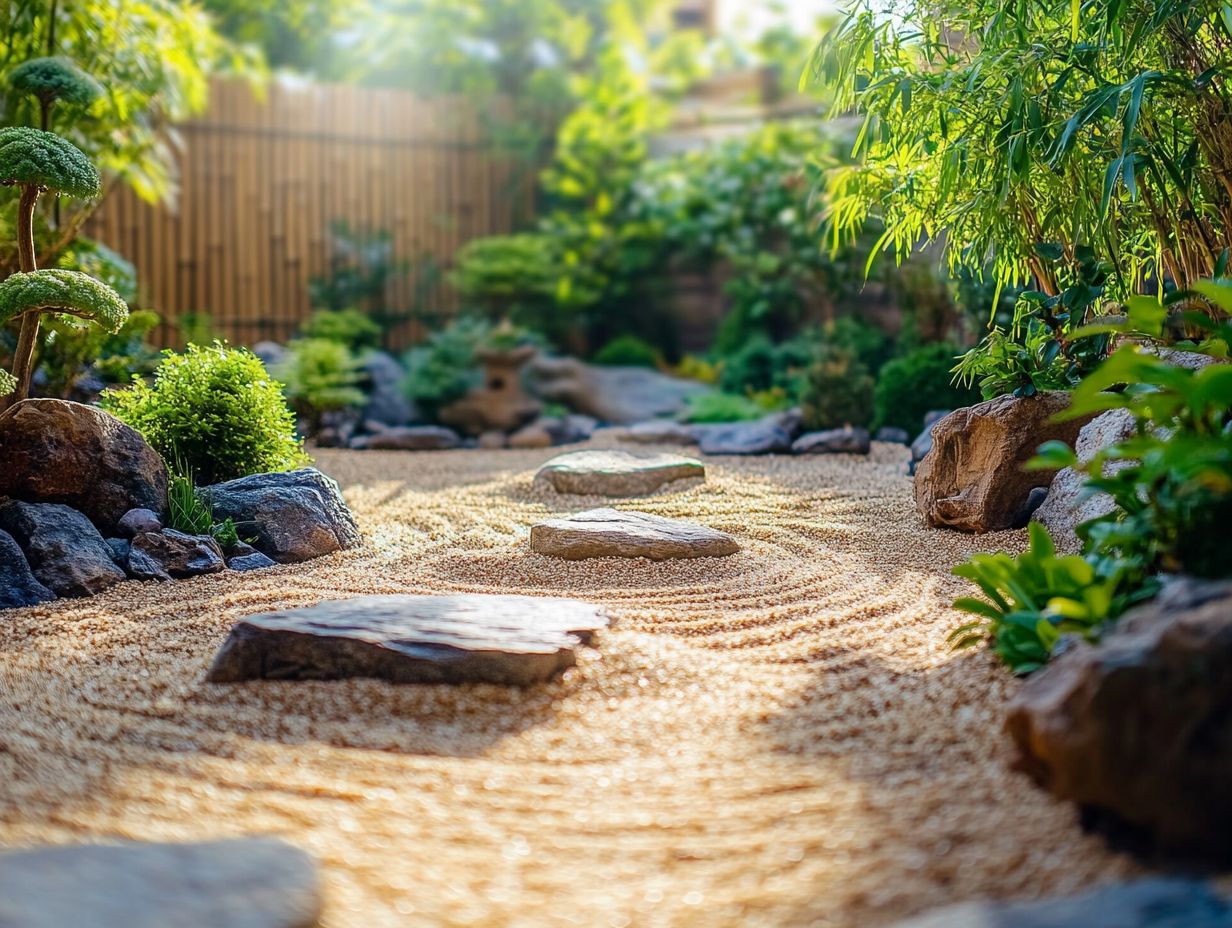
Choosing the right plants makes your Zen garden truly serene. It transforms the space into a peaceful retreat.
By selecting species that exemplify simplicity and harmony like:
- Bamboo
- Japanese Maple
- Moss
You create a seamless visual flow that fosters a tranquil environment.
This curated selection connects you to nature, cultivating mindfulness and inner peace.
Types of Plants to Consider
When selecting plants for a Zen garden, think about those that thrive in harmony with their surroundings. Choices like Bamboo, Japanese Maple, and Moss bring unique qualities for seasonal care and offer therapeutic benefits.
Bamboo introduces vertical elegance and produces a gentle rustling sound in the breeze, creating an ideal backdrop for contemplation.
The Japanese Maple, with its intricate leaf shapes and vibrant hues, draws admiration and serves as a stunning focal point throughout the seasons.
Moss blankets the ground in lush greenery, providing a soft, serene foundation that beckons bare feet.
To keep these plants thriving, engage in proper care, including seasonal pruning and mindful watering. This attention allows them to flourish, amplifying their calming effects and transforming any space into a sanctuary of peace.
Factors to Consider in Plant Selection
When selecting plants for your Zen garden, consider factors like:
- Climate adaptability (ensure the plants can grow well in your local weather)
- Maintenance needs
- Visual balance
Each plant should enhance the beauty of your space and contribute to the overall harmony of the garden, embodying the essence of Japanese culture.
By paying attention to colors, symbolism, and the unique characteristics of each plant, you can cultivate a serene environment.
Actively choosing the right plants creates a peaceful coexistence with nature, allowing your mind to wander freely.
Understanding maintenance requirements helps you balance effort and enjoyment, making your garden a stress-free retreat.
Achieving visual balance through strategic plant placement and diversity adds layers of interest to the landscape, transforming it into not just a visual delight but also an inviting space for contemplation and repose.
What plants will you choose to create your tranquil space?
Caring for Plants in a Zen Garden
Caring for plants in a Zen garden requires a blend of mindful maintenance practices that help them grow well and elevate the garden s tranquil environment.
This entails regular pruning, diligent weeding, and seasonal care routines that ensure each plant flourishes. By doing so, you enhance the therapeutic benefits and serene atmosphere that define your garden oasis.
Essential Tips for Maintaining Your Zen Garden
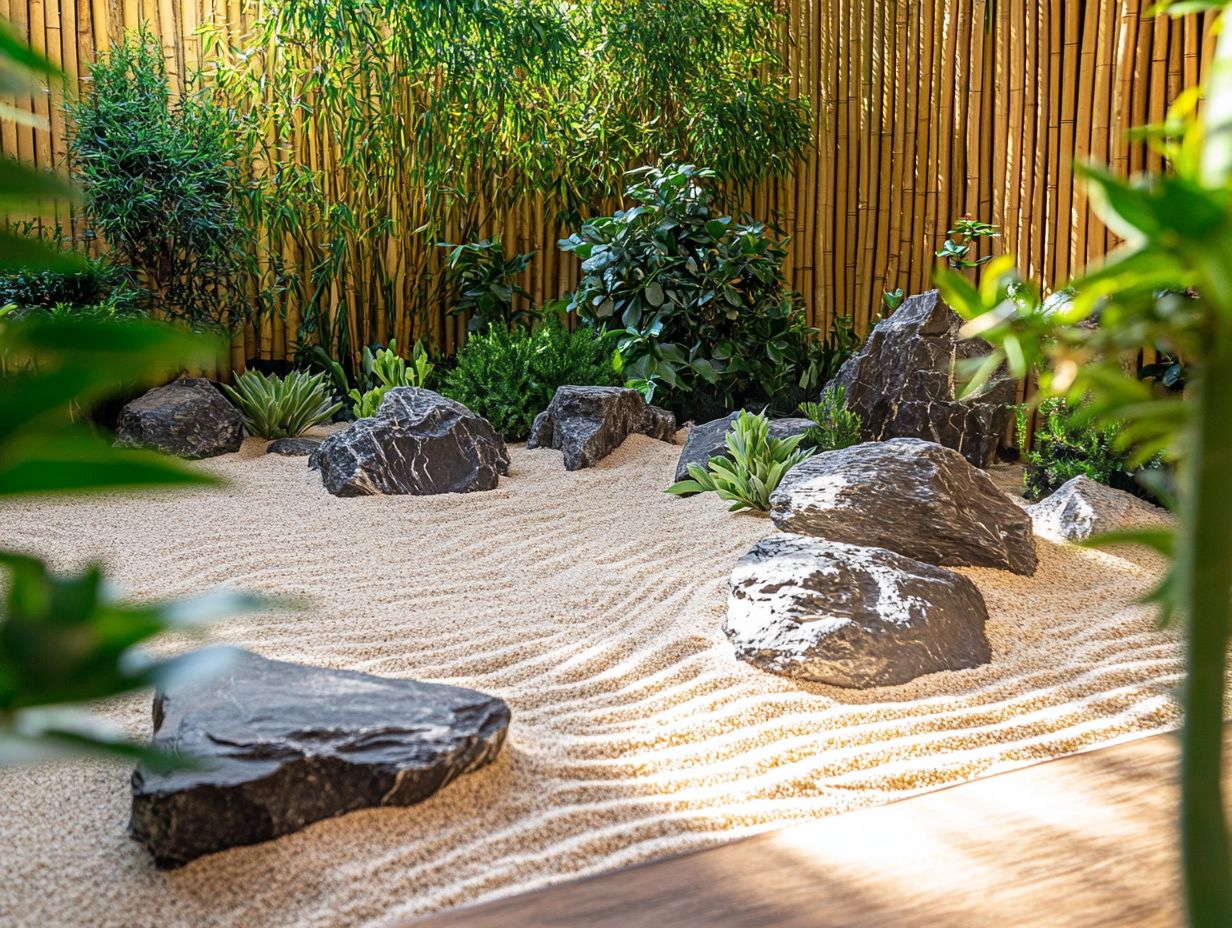
Effective maintenance and pruning tips are essential for keeping your Zen garden thriving. Regular weeding, meticulous pruning, and following seasonal care guidelines ensure that each plant stays healthy. This enhances the tranquil atmosphere of your garden and supports its therapeutic benefits.
Regularly checking the health of your plants is crucial. Early detection of any issues can prevent larger problems in the future. Selecting the right tools for pruning, like sharp shears for those delicate branches, is key to supporting the plants’ recovery and growth.
Mulching serves a dual purpose: it suppresses weeds and retains moisture, benefiting the overall landscape and promoting a healthy outdoor space. Mindfully arranging stones and gravel not only elevates the aesthetic appeal but also promotes sustainable practices within your serene setting.
Benefits of Plants in a Zen Garden
Plants do more than just make your Zen garden look beautiful they boost your mental well-being too! They play a crucial role in cultivating a serene, harmonious environment.
Interacting with these natural elements encourages mindfulness, providing therapeutic benefits that facilitate inner peace and alleviate stress.
Mental and Physical Health Benefits
Engaging with a Zen garden offers a wealth of mental and physical health benefits, including stress relief and enhanced mental well-being. The therapeutic nature of these gardens encourages mindfulness and fosters a sense of tranquility that positively impacts your overall health.
Research indicates that spending time in serene environments can significantly lower cortisol levels, effectively reducing stress and anxiety. For example, a study from the University of Essex found that participants who engaged in nature-based activities, including Zen gardening, reported notably improved moods and diminished feelings of tension.
Many individuals have shared that the rhythmic act of raking gravel and arranging stones cultivates a meditative state, allowing for deeper reflection and emotional clarity. The natural aesthetics of a Zen garden can ignite creativity and sharpen focus, making it the perfect retreat for anyone seeking both mental rejuvenation and physical relaxation.
Creating a Peaceful and Harmonious Space with Natural Elements
Creating a peaceful and harmonious space in your Zen garden demands thoughtful design and intentionality. Focus on elements that promote balance and the flow of energy. Embracing Feng Shui principles, which is an ancient Chinese practice of arranging spaces, helps create balance.
Consider the placement of rocks, gravel, and plants. Ensure they complement the natural landscape while allowing for a seamless transition between elements. Aim for an arrangement that reflects asymmetry, a hallmark of Zen aesthetics, encouraging the eye to wander gently through the space. Choosing plants that embody serenity, like bamboo or flowering stones, will enhance the calming effect of your garden.
Don t overlook the importance of pathways and seating areas; they provide opportunities for reflection and connection with nature, ultimately leading to a more harmonious atmosphere.
Frequently Asked Questions about Zen Gardens
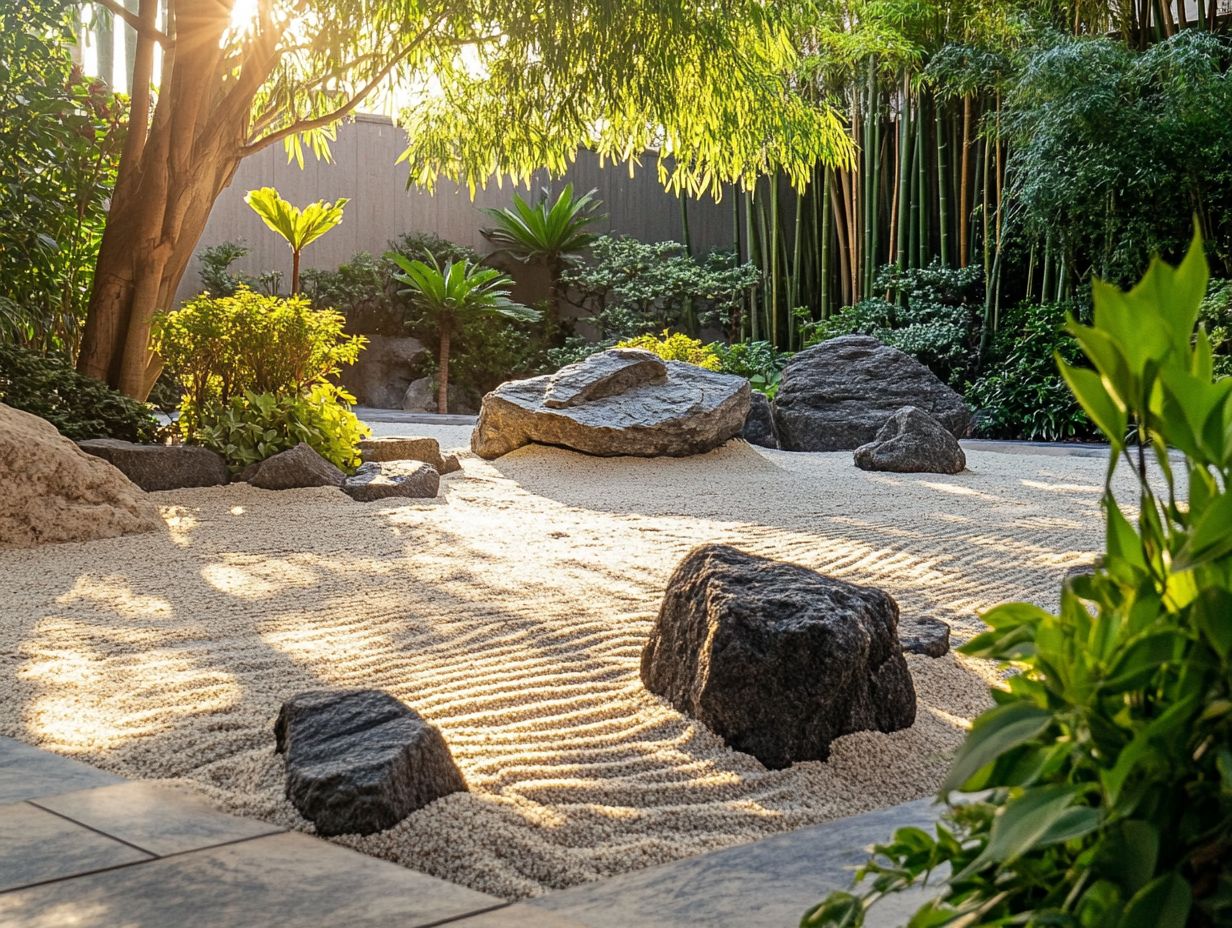
Q1: What is the purpose of choosing plants for a Zen garden?
A1: The main purpose of choosing plants for a Zen garden is to create a peaceful and tranquil space for meditation and contemplation.
Start designing your peaceful Zen garden today and experience its calming magic!
Q2: What types of plants are commonly used in a Japanese Zen garden?
Some common plants in Zen gardens are evergreen shrubs, ornamental grasses, and mosses.
These plants are simple and easy to care for.
Q3: How should I choose plants for my Zen garden to ensure balance and harmony?
Choose plants based on their texture, color, and shape.
Look for calming plants to foster a peaceful atmosphere.
Q4: Do I need to have a specific layout or design for my Zen garden to ensure energy flow?
There s no fixed design for a Zen garden.
Balance is crucial for your garden s design. Select complementary plants to create harmony.
Q5: Can I incorporate flowers in my Japanese Zen garden?
Flowers are not usually found in traditional Zen gardens, but you can add them.
Just ensure they maintain the garden’s simplicity and tranquility.
Q6: How can I maintain a Zen garden with the chosen plants to ensure seasonal care?
Keeping your Zen garden thriving is easy!
Just trim and prune regularly, and watch your plants flourish in the sunlight.
Remove dead leaves and ensure they receive enough sunlight and water.


